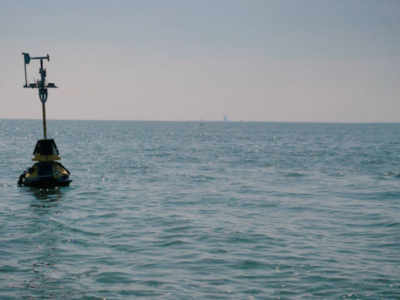
Keep up with energy-related developments in the Great Lakes area with Great Lakes Now’s biweekly headline roundup.
Click on the headline to read the full story:
Illinois:
- Illinois prepares to reboot low-income solar program to improve access for all — Energy News Network
Illinois Solar for All is getting a boost from new state funding and rules that will empower community groups to do more outreach and education, which advocates hope will help identify more potential participants.
- Vistra proposes in-place closure of ash pond — Metropolis Planet
Vistra Energy held two public meetings to provide details on their plans to cap a southern Illinois coal ash storage site and build a utility-scale solar project on top of it.
Indiana:
The northern Indiana utility NIPSCO wants to raise rates to clean up coal ash ponds at its Michigan City coal plant and consumer advocates fear other utilities in the state may follow suit.
- Indiana releases draft plan for building out electric vehicle infrastructure — Indianapolis Star
The Indiana Department of Transportation released its draft plan last week, which describes when, where and how it plans to deploy a network of electric vehicle charging stations capable of charging up cars in a matter of minutes ― and ensure the network is sustainable.
Following the Indianan Department of Transportation’s EV network plan, a coalition of gas stations and retailers says there are not enough fast chargers in the state to successful make the transition to EVs without the help of private businesses — and right now many of those businesses cannot afford fast-chargers without state or federal assistance.
Michigan:
Power grids are dangerously strained and rolling blackouts are growing increasingly common across the country. Outages are so routine in some Detroit suburbs ― up to six times a year ― that one retiree depleted their savings to buy a generator to secure their breathing machine.
Michigan-based startup Sesame Solar is producing the world’s first fully-renewable nanogrid for natural disaster relief. The units can be used as mobile communications and command centers, medical units, kitchens and even temporary housing. Previously, mobile units like these have typically been powered by diesel fuel.
- GM joint venture gets $2.5 billion government loan to help build EV battery cell plants — Detroit Free Press
General Motors’ joint venture with LG Energy Solution is on track to receive a multibillion-dollar loan from the U.S. government to build battery cell plants for electric vehicles, including one going up in Lansing. The Department of Energy announced “a conditional commitment” for $2.5 billion to GM and LG’s 50-50 joint venture called Ultium Cells LLC.
- GM seeks Green Bond loan to fund past and future zero emission projects — Detroit Free Press
General Motors says it will take out fixed-rate bonds to invest in projects such as zero-emission vehicles, battery systems, fuel cells and charging infrastructure.
- Crude Oil Catastrophes Part 3: “A Tale of Two Treaties” — Michigan Radio
Two different treaties with the U.S. could lead to very different outcomes for Line 5 – a controversial pipeline in the Great Lakes. One treaty is with Canada, promising not to disrupt the flow of hydrocarbons across the border. The other one is with Tribal nations in what’s now northern Michigan; it guarantees the right to hunt and fish throughout their ceded territory.
How the U.S. decides to interpret conflicting treaties with Indigenous tribes and Canada could determine the fate of the Line 5 pipeline in the Straits of Mackinac.
An historic wind turbine that for decades served as a clean energy symbol and up north geographic marker recently came down near Traverse City. When first built in 1996, the historic M-72 wind turbine was the United States’ tallest and largest energy-producing wind turbine, plus Michigan’s first owned by a municipal electric utility
In Detroit, the majority of charging stations are located in affluent areas with small minority populations. Multiple studies have shown that purchasing and charging electric vehicles presents unique financial and safety challenges for people of color.
Minnesota:
Solar energy jobs were up in 47 states and increased 9% nationwide from 2020 to 2021. Minnesota saw an increase of 14%. The industry growth is due to a year of record solar installations driven by increased demand for renewable energy among residential customers, municipalities, businesses, and electric utilities.
- Minnesota initiative aims to lower energy burden in manufactured homes — Energy News Network
The Minnesota Clean Energy Resource Teams, a public-private partnership, has launched an initiative to lower energy costs in manufactured home communities by connecting them with federal resources.
Ohio:
- Shaker Heights forwards city-run green energy electric aggregation plan to PUCO (Corrected) — Cleveland.com
The Cleveland suburb of Shaker Heights has submitted a plan to state regulators for a citywide electric aggregation program that would be sourced entirely by renewable energy.
Duke Energy’s request to raise distribution rates by $55 million to pay for grid improvements received opposition from residents and business owners in southwestern Ohio.
- The Energy Transition Runs Into a Ditch in Rural Ohio — Inside Climate News/ABC News
Resistance to renewable energy is growing in America’s farm country. In the Ohio village, a solar proposal has divided the community reflecting in a growing national trend that threatens to slow the clean energy transition.
Wisconsin:
Enbridge announced that construction is underway for two solar farms in both Portage and Adams. The two projects combined will create 20 megawatts of solar energy that will be used to help power the company’s crude oil pipeline system.
Two local officials in northeastern Wisconsin were recently recalled based on their support of and potential conflict of interest with a large-scale solar project.
A renewable energy fair in Custer, Wisconsin draws thousands of visitors each summer and growing demand is making it difficult for solar installation businesses to find enough workers.
- UW-Stout: University’s energy conservation project approved — WisPolitics.com
The Wisconsin State Building Commission has approved a $2.7 million energy conservation project at the University of Wisconsin-Stout. The project will provide a 400-kilowatt rooftop solar array, LED lighting upgrades, weatherization improvements and the installation of new destratification fans in the campus Sports and Fitness Center.
Great Lakes Region
- MISO approves large grid expansion, paving way for renewables — E&E Energy News
- Utilities plan to spend $2.2B on new power line projects in Minnesota — Minnesota Star
- $10.3 billion investment to upgrade Midwest, Michigan power grid for renewable energy — Detroit Free Press
The recent $10.3 billion investment by the Midcontinent Independent System Operator (MISO) which manages the grid in 15 states across the Midwest and parts of the South made headlines in multiple media outlets.
The MISO board of directors approved the upgrade of power transmission across nine states as part of their broader effort to build a smarter, more nimble power grid and boost the resilience of the system as it grapples with extreme weather fueled by climate change.
The decision marks the most U.S. power lines, 18 new high-voltage transmission lines, ever approved at once and was hailed by climate advocates as a model for the nation.
- Illinois, Indiana, Wisconsin join Whitmer’s Lake Michigan EV charging circuit — Detroit Free Press
The states of Illinois, Indiana and Wisconsin have signed an agreement with Michigan to add charging stations and boost electric vehicle use around Lake Michigan. The effort is known as the Lake Michigan Electric Vehicle Circuit Tour.
National
- ‘A small gift to the planet’: U.S. Energy Secretary discusses the future of energy at Argonne —Daily Herald
U.S. Energy Secretary Jennifer Granholm visits a national research lab in Illinois that recently completed an $815 million upgrade to more closely study clean energy technologies.
The Biden administration is hoping to spur the development of 134 gigawatts of new solar power capacity nationwide. A new initiative would connect participants in a federal program that subsidizes energy costs for low-income residents with developers of community solar projects, which sell subscriptions to households for renewable power with the promise of lowering their monthly electricity bills.
Sixteen years ago, Tesla CEO Elon Musk announced his goal of building the first truly low-cost electric family car. Now General Motors has beaten him to it.
Catch more news at Great Lakes Now:
Energy News Roundup: Green jobs, solar farms and the value of trees




